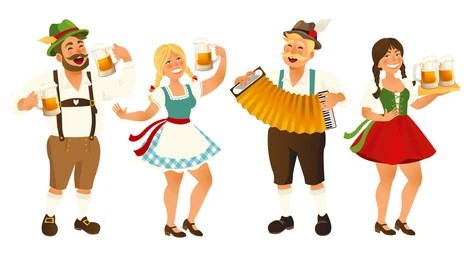Germany, a country that celebrates its rich history and vibrant culture, is often a many-sided way of experiences that reflect on both its past and the present. From the legacy of its great past to why people should care about aspects of German culture. It is a blend of tradition and innovation.
Germany’s culture is known for its history. The country’s biggest contributions are to philosophy, music and the arts where they have left marks all over the world. Thanks to Germany, we are all able to use computers, ride bikes and print out papers for school or work.
“I love being a part of German culture,” said Emma Becker. “We have heard so many traditions and new ideas that deeply shapes daily life and I’m glad I get to use these inventions.”
These historical elements continue to shape modern German life.
“Without computers, we wouldn’t just lose efficiency; we’d miss out on how we create and stay connected with our cultural heritage,’” she added.
One tradition of German culture has happened and has been brought over to the U.S. is Christmas markets, also known as Weihnachtsmärkte. This is a big part of German culture. These markets include and feature a large amount of homemade and handcrafted goods, festive decorations and traditional foods like Bratwurst and Glühwein (mulled wine), offering a glimpse into the country’s deep-seated customs.
During modern times, Germany is well-known for its innovation and forward-thinking skills. For example, some cities like Berlin and Munich are now renowned due to their cultural energy, passion and technological advancements. Berlin has been the most evolved into a center point for its creativity and technology, known as being a melting pot of diverse cultures and ideas.
The German education system also plays a huge role on what the future of the country is known for. By being well-known for a strong academic foundation, Germany’s paired education system combines classroom instruction with hands-on work-related training, which is equipping students with practical skills and abstract knowledge.
“I wish more school districts would put more hands on learning in the classrooms and start early,” said Max Meyer. “If the youth learned more about the workforce, the more educated they will be and kids won’t be as lazy today.”
The German loyalty to environmental sustainability is another big area of focus. With having determined goals to reduce carbon leaks and showing support of renewable energy, Germany has put itself as a leader by green technology. This is reflected into everyday life, from different types of recycling programs to the currency of eco-friendly transportation options.
“The environment is so important, not just for right now, but for future generations. We must be protecting our planet as it is basic to our identity, a shared responsibility shown in respect for the world we see it as and the one we leave behind,” said Julia Peterson.
German culture is a blend of tradition and modernity. It is known for its historical inventions to the arts and philosophy as we know it today. Germany offers a rich and powerful cultural experience. Whether it comes to festive markets, cutting-edge technology, or philosophical insights, the spirit of Germany continues to thrive and inspire and change for the good.

